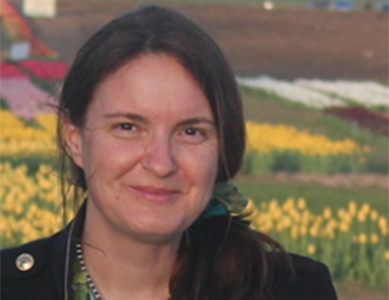Magdalena Farc
2024 Full-Time Faculty Member of the Year

Magdalena Farc has been an instructor of psychology at MCC for 16 years, each year inspiring students to learn as much about themselves as they do the class material. Farc, who holds a Ph.D. in social/industrial-organizational psychology from Northern Illinois University, was recently recognized as MCC’s 2024 Full-Time Faculty Member of the Year. The award recipients, selected by peers, are chosen based on their commitment to teaching, contribution to the college community, and professional development.
“Magdalena is not only an excellent teacher who cares deeply for her students, but she is a psychologist who is passionate about making the world a better place and helping students become well-rounded members of our community,” said Dawn Katz, Dean of Business, Social Sciences, and Public Services at MCC. “She helps students gain a scientific understanding of behavior and mental processes; about the link between their bodies and their minds; the way in which they remember or think about reality; and about human diversity. Through all her work and interactions, she remains humble, gracious, and scholarly.”
During her time at MCC, Farc has taught various psychology courses, including Introduction to Psychology, Social Psychology, Child Psychology, Personality Psychology, and Educational Psychology. She has additionally taught for MCC’s Kids and College program, actively participates in recruitment and retention initiatives, and has supported student organizations such as the Homeless Aid Coalition and MCC’s chapter of PSI Beta, the Community College National Honor Society in Psychology.
Farc is also a leader among faculty and is the former chair of the Psychology department, serves on several faculty committees, and helped design the faculty speaker series, Experts and Insights.
“I am a strong believer in MCC’s powerful, positive influence in our community, and I’m grateful to be a part of its vibrant Psychology department,” Farc said. “I feel honored to be a teacher and inspired to encourage my students as they strive to grow in knowledge. My greatest joy at MCC is to witness my students adding meaningful chapters to the stories of their lives.”
Teaching has always been Farc’s vocation. She stared as an elementary school teacher in her native Romania, aiming to inspire a love of learning in first and second graders. Decades later and an ocean away, she entered the college classroom with the conviction that students should first and foremost pursue an education in the art of living.
“I believe that to live fully, students need to open their hearts and minds to the fascinating world of human understanding; they need to make intellectual discoveries, conquer the barriers of time and imagination, and build the shape of their character,” she said. “First graders and college students alike have taught me that a good teacher is a hero of the human spirit, so I enter the classroom believing that my vocation is, in essence, an exercise in giving.”
Farc strives to bring psychology to life in the classroom, sharing relevant ideas with students and working with them to build a community of strong minds and compassionate hearts.
“Many of my favorite moments in class happen when students are learning in an active, respectful environment,” she said. “In my social psychology course for instance, students reflect on ways in which class concepts connect to societal trends. This semester, we’ve been busy exploring principles of constructive dialogue in a polarized society and have also discussed how social biases infiltrate generative AI models.”
When they talk about statistics and how sample size influences bias, students in Farc’s class are asked to predict how well the color distribution of M&Ms from a small, fun-size package predicts the color distribution of the entire population of M&Ms. Another one of Farc’s activities helps to explain the speed of a traveling neural impulse.
“Students engage in the ‘Dollar Drop’ activity, where they try to use their non-dominant hand to catch a dollar bill released by someone else or themselves,” she said. “We then discuss how neural transmission speeds influence reaction times.”
Whether she is teaching introductory or more advanced psychology courses, Farc always tries to maintain equilibrium between her role as an active educator and a facilitator of active learning.
“Almost every class I teach is becoming an intellectual space where I hope my students have the freedom to voice their opinions. I not only encourage, but truly rejoice when students are so passionate about psychology that they start giving examples from their own life, bringing up lesson-related topics for conversation, and asking me inquisitive questions,” she said.
Farc’s areas of expertise include topics such as attitudes, mindsets, and automatic thinking processes.
“I am currently focused on implementing psychologically wise instruction in my classes, knowing that it has the potential to improve academic achievement and transform students’ perspectives about themselves, others, and their relationship with school.”
Her ultimate goals for her students are embodied by MCC’s mission.
“I hope my students become lifelong learners and master themselves and their worlds with success and integrity,” she said. “I rejoice when I see that students are choosing the pathways that bring them both academic success and meaningful, joyful experiences along the way. I have had the privilege of teaching thousands of students by now, and I treasure the time I got to spend with all of them.”
Many of Farc’s former students have had outstanding academic trajectories at universities like DePaul, Loyola, ISU, UIC, UIUC, and NIU.
“I encourage my students to always couple excellence in scholarship with compassion, to strive to move from the realm of knowing what is good to being good and doing what is good. I encourage them to become the heroes of their own epic poems. To write a verse of character and integrity, surrounding themselves with values that enrich; a verse of courage – the courage to face fears, to take chances, to learn from their mistakes, to make their vision become reality, to love; a verse of perseverance and hope; a verse of true and just thought, and a verse of compassionate deed.”
Outside of MCC, Farc says that growth continues to be a source of energy.
“My children’s growth gives me meaning, a sense of purpose, and unlimited joy. My family’s adventures in nature, whether it’s mountaineering or gardening, are a spring of renewal, and my beginner’s attempts at playing the Celtic harp, mandolin, and piano are whispering about the power of small progress. My family, my faith, and my friends are my living waters of rest and refuge.”
